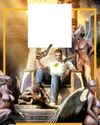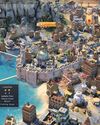
Founded in 1986 by firebrand designer Ian Anderson, TDR – aka The Designers Republic – is a figurehead of the SoYo (as in South Yorkshire) movement, self-styled opponents of an older, supposedly stagnant design scene in London. Its style is one of Russian Constructivism bred with Asian logotypes and ’90s information overload – altogether dubbed ‘Nihonpop’ by fans. But in truth it is more varied, as shown by TDR’s work with electronic music label Warp Records. Much of its output is antiestablishment, littered with merry bastardisations of corporate brands and slogans. In 1995, Keith Hopwood, creative services manager at Psygnosis, was at its door.
“Ian was spiky,” Hopwood recalls. “I’m embarrassed to say I was completely in awe of him and what they stood for. He was a bit dismissive which meant I was a bit downbeat. But really it was all about damage control, because the worlds of advertising and games had no real connection; agencies had wanted to dabble, but the big names weren’t interested.” TDR’s big four were co-founders Anderson and Nick Philips, plus Michael Place and Nick Bax. Bax, an art and graphic design graduate, had joined in 1990, returning from London studio Mainartery, designing for clients such as Sony and EMI. “Gaming,” he remembers, “was geekier back then. I’m massively generalising, but people into dance music and designing cool things were not into Dungeons & Dragons and video games. A lot comes down to the enthusiasm of the Psygnosis team kind of stroking our egos.”
This story is from the Christmas 2024 edition of Edge UK.
Start your 7-day Magzter GOLD free trial to access thousands of curated premium stories, and 9,000+ magazines and newspapers.
Already a subscriber ? Sign In
This story is from the Christmas 2024 edition of Edge UK.
Start your 7-day Magzter GOLD free trial to access thousands of curated premium stories, and 9,000+ magazines and newspapers.
Already a subscriber? Sign In

HENRY HALFHEAD
Where's your head at?

CROTEAM
How a gaggle of football fans became the self-appointed national dev team of Croatia

TEMPEST RISING
Heading to the future for a very '90s war

Sid Meier's Civilization VII
Anyone who's engaged with Sid Meier's strategy series during its 34-year existence knows that the most exhilarating turns in a game are the initial ones. Sure, the mid-game can be an absorbing juggling act, requiring you to manage diplomatic crises and placate the citizens of a sprawling empire, while choreographing your battalions' advance into enemy territory.

HEAVY HITTER
Doom looks to the past for its biggest and weightiest iteration yet

Darkest Dungeon II
Having marvelled at Red Hook's leftfield approach to sequel-making in E385's review, Darkest Dungeon II's Kingdoms DLC was always going to pique our interest.

ASSASSIN'S CREED: SHADOWS
Ubisoft's signature series finds itself at a crossroads. After Valhalla concluded Assassin's Creed's trilogy-length RPG pivot back in 2020, it was three years - which felt like an eternity for this once-annual series - before Mirage arrived, with its promise of a return to the concept's stealthgame roots, and no pretence to the scale of its immediate predecessors.

THE MAKING 0F... ARCO
How a ramshackle gang of indie developers formed over three continents to produce an epic reverse western

DEATH HOWL
A gloomy deckbuilding odyssey and an accidental Soulslike

Sludge Life
Peer through the haze to discover a game that makes you ask some surprisingly sharp questions
